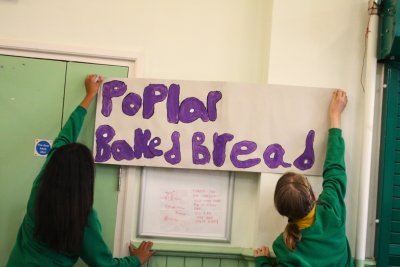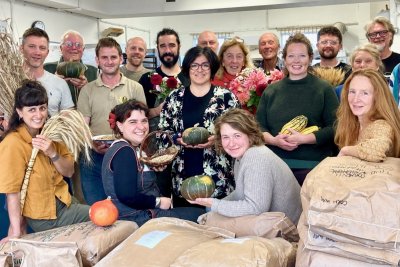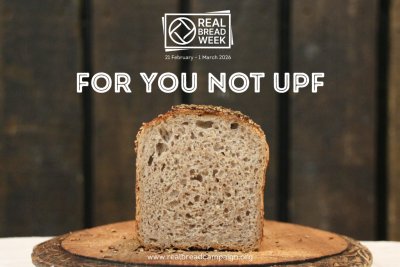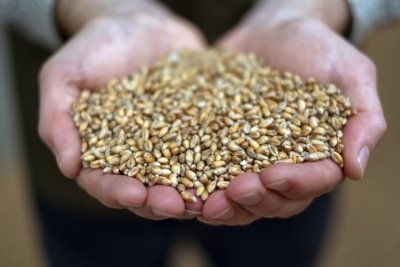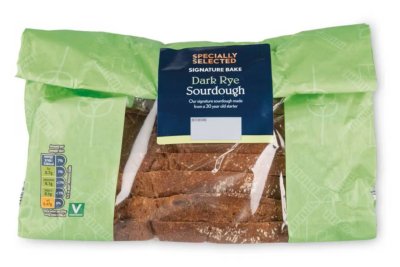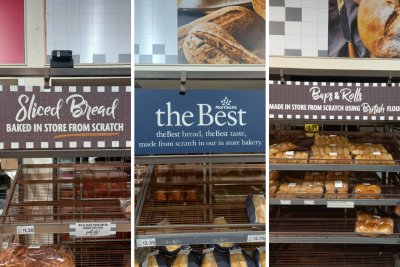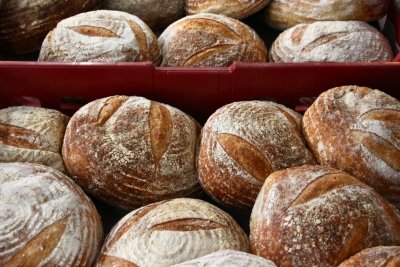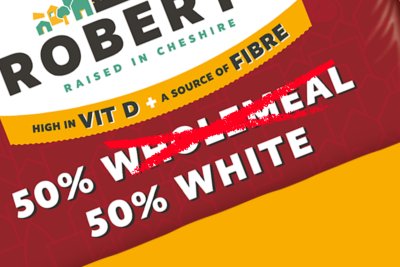 What's in a name?. Copyright: Roberts Bakery (fair use)
What's in a name?. Copyright: Roberts Bakery (fair use)
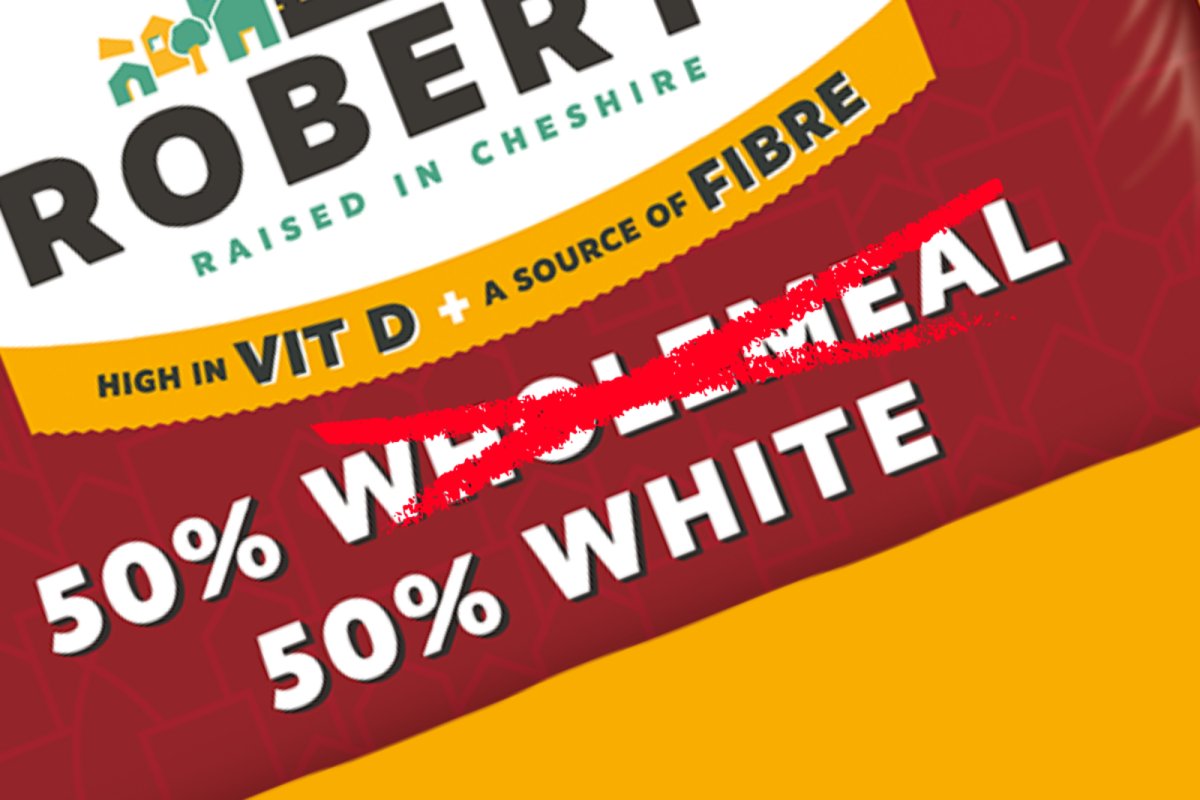
What’s ‘wholemeal’ hiding?
The Real Bread Campaign questions loaf label legality.
In light of new guidance from Defra, the Real Bread Campaign has launched an investigation into brands using the word ‘wholemeal’ to name products containing non-wholemeal flour.
Most notable of the Campaign’s findings was a product manufactured by Roberts, in which half of the flour was white.
Regulation 6 of The Bread and Flour Regulations demands that: 'There shall not be used in the labelling or advertising of bread, as part of the name of the bread, whether or not qualified by other words - the word "wholemeal" unless all the flour used as an ingredient in the preparation of the bread is wholemeal.'
Real Bread Campaign coordinator Chris Young said: ‘The Regulations are clear that if any non-wholemeal wheat flour is used, the word wholemeal must not appear in the product name. Highlighting the presence of other flour does not grant an exemption, nor do the Regulations include a minimum-quantity threshold.’
Not all wholemeal
In April 2025, the Campaign looked at products manufactured by / for the UK’s 10 biggest supermarket chains and other large industrial dough fabricators. The Campaign found the following brands using the word ‘wholemeal’ in the name of one or more products in which non-wholemeal wheat was used as an ingredient:
- Asda
- The Co-op
- Hovis
- Iceland
- Jacksons
- M&S
- Morrisons
- Roberts
- Tesco
- Waitrose
On 30 April 2025, the Campaign wrote to the companies, asking them to advise whether they will be removing either the word wholemeal from the names of non-compliant products or all non-wholemeal flour from their formulations.
The Campaign also wrote to Aldi and Lidl for ingredients lists, which both companies choose not to publish on their websites.
The law
The recently-published, official guidance to The Bread and Flour Regulations includes confirmation that Regulation 6 means: ‘When labelling or advertising bread, the word ‘wholemeal’ is only allowed in the name of the bread when all of the flour used as an ingredient is wholemeal.’
The term ‘wholemeal flour’ (or ‘wholemeal wheat flour’) must, however, appear on the ingredients list.
The Regulations do not provide any exemption for the word ‘wholemeal’ to be used to name a product on the basis of:
- The amount of non-wholemeal flour being ‘small’ or ‘minimal’.
- Any perception that the word’s use is ‘not misleading’, for example a product that is clearly labelled as being 50% white.
- The point at which flour is used. The Co-op once argued a product was exempt because it was dusted with flour after baking.
Young said: ‘I had to laugh at Co-op’s attempt at justification. The white flour was on the ingredients list and yet the company claimed it wasn’t an ingredient but a “dressing”. It was the only time in more than 15 years I’d heard of flour being added flour after baking, as if it was icing sugar. It would also be a concern if Co-op was admitting to serving raw, unbaked flour for its customers to eat, against official guidance from the Food Standards Agency.’
Exceptions
Despite this unequivocal, zero-tolerance approach, the Regulation contains two key loopholes that the Real Bread Campaign challenges:
- It only applies to wheat flour. Any amount of refined / non-wholemeal products from other grains, legumes, tubers etc. can be used, because the Regulations do not consider them to be flour, so they fall outside the ‘all the flour’ requirement.*
- It does not apply to other products of wheat. A manufacturer can dilute the wholesomeness of wholemeal flour by the addition of any quantity of highly-refined gluten power, wheat starch etc.
*which begs the questions: if soya flour isn’t flour, then what the heck is it and why is it legal to name it 'soya flour' on an ingredients list?
History
The Campaign has previously challenged the use of the word ‘wholemeal’ in the names and marketing of products manufactured using non-wholemeal flour. Resulting changes have included:
- Aldi: removed wholemeal’ from ‘Both in One’ pack front. (by April 2025)
- Iceland: discontinued ‘White and Wholemeal’. (January 2023)
- Sainsbury's: renamed ‘wholemeal tortilla wraps’ (July 2023), removed wholemeal’ from ‘Both in One’ pack front. (October 2023)
- Warburtons: renamed ‘Half White Half Wholemeal’ as ‘Half & Half’ (by January 2024)
Resolution of other complaints was left in limbo, while a number of trading standards officers awaited Defra’s long-promised guidance.
See also
- Wholemeal bread
- Loaf-tanning salon lies?
- Supermarket loaves: why the massive markup?
- Is Kingsmill’s whole grain claim legit?
Updates
24 June 2025: Roberts Bakery emailed us, wiriting that they had notified Cheshire and West Chester Council that the company 'will add ‘flour’ to the product name on the Front of Pack, so it matches the Back of Pack legal description.'
We replied to Roberts Bakery and the council, reminding them that the Regulations demand: 'There shall not be used in the labelling or advertising of bread, as part of the name of the bread, whether or not qualified by other words - the word "wholemeal" unless all the flour used as an ingredient in the preparation of the bread is wholemeal.' [our italics]
The governmental guidance from Defra emphasises the fact that ‘when labelling or advertising bread, the word ‘wholemeal’ is only allowed in the name of the bread when all of the flour used as an ingredient is wholemeal.’
The only way to comply with the law is by removing the word wholemeal from the product’s name, rather than adding the word flour to it.
23 June 2025: Cheshire and West Chester Council asked us if Roberts Bakery had been in touch.
17 June 2025: LBTH replied 'Have you considered raising your concerns with the FSA? It might be more appropriate for them to lead on this and have a discussion with the industry as a whole rather than local authorities in silo.'
We replied that we very much wish there was a single, national point of contact for sector-wide issues such as this. Our understanding is that investigation and resolution of this apparent regulatory breach falls outside the remit of the FSA, as does food labelling in general. In September 2024, the FSA advised us: ‘We no longer deal with labelling, the only labelling we deal with is allergen labelling.’
We added that Defra is responsible for legislation, but not enforcement of it. That leaves trading standards and (where applicable) the Advertising Standards Authority.
5 June 2025: We submitted our complaint to the trading standards department of London Borough of Tower Hamlets, the local authority for the Sustain / Real Bread Campaign office.
We asked LBTH to advise what action you they be taking (in co-operation with the relevant Primary Authorities) to ensure that Asda, The Co-op, Hovis, Iceland, M&S, Morrisons, Tesco and Waitrose remove either the word wholemeal from the names of non-compliant products, or all non-wholemeal flour from their formulations, and the estimated timescale for this process.
We highlighted that The Regulations grant no exemption to the ‘all of the flour must be wholemeal’ rule based on the quantity being minimal; or due to the reason for it being used as an ingredient, present in the finished product. We also noted that, notwithstanding this, in some products we had found non-wholemeal wheat flour being used as a major ingredient, in greater quantity than at least salt, one of the four basic components of yeasted bread.
3 June 2025: A week since Waitrose's holding message, we asked for answers or, at very least, an ETA for them. They replied: 'The response we response we received [from our Quality & Technical Team] was "100% of the flour that is part of the flour content of the loaf is wholemeal. The rest are minor ingredients as part of the Campden Chorleywood process for making bread, that are declared due to their allergen content"'
A trading standards officer at Cheshire and West Chester Council (Roberts Bakery's Primary Authority) replied: 'I have been in contact with the bakery and still awaiting a response. I have chased this up again today and I will be in touch very soon.'
2 June 2025: The reply from Jacksons Bakery revealed that we had contacted the wrong one, so we submitted our question via the online form on the correct company’s website.
1 June 2025: Iceland again responded 'I cannot imagine how stressful this must have been when noticing that the term whole meal is on our Daily Bakery products and that your research shows that this does not contain the ingredients of the whole meal.' This time they added: 'I have escalated this to the relevant department. As soon as we receive feedback, we will advise you further.'
30 May 2025: One month since writing to the companies, we followed up with Iceland, Jacksons, M&S, Morrisons, Tesco for replies. We also re-sent our complaint about Roberts to Cheshire and West Chester Council; and again asked Asda to advise their timescale for completing the review and making necessary changes.
Morrisons responded: 'Please be advised that we have further highlighted this concern with our buyer to get updates on this. Once we have any updates on this matter then I'll share with you on the same email.'
27 May 2025: We responded to Waitrose that The Bread and Flour Regulations do not provide any exemption to the ‘all flour must be wholemeal’ rule based on quantity. We also noted that, even if one were to accept that defence hypothetically, two of the three products contain a greater quantity of non-wholemeal wheat flour than salt – one of the main (not minor) ingredients of most bread (and products marketed as ‘bread’). In one of these two, there is more non-wholemeal wheat flour even than yeast.
We also replied to Hovis, noting that The Bread and Flour Regulations do not provide any exemption to the ‘all flour must be wholemeal’ rule based on quantity.
26 May 2025: Hovis replied 'We are confident that information shown on our packaging meets the requirements of not only the amended Bread and Flour Regulations but also all relevant legislation applicable for food labelling.'
23 May 2025: Waitrose wrote: 'We're in line with other retailers in the labelling approach on wholemeal. For both loaves, there are more minor additional ingredients listed than would normally need to be in a declaration due to them containing an allergen - eg dusting flour, or flours that are part of a crumb softener, hence the additional wheat flour minor ingredients listed. This is to ensure allergen labelling rules are followed as a priority. The malted barley is also an example of where we need to declare it for the barley allergenic content in the instore bakery loaf.'
14 May 2025: Having not received a response from Roberts, we submitted a complaint to Cheshire and West Chester Council, the company's Primary Authority for trading standards.
13 May 2025: Hovis responded by claiming they had not received our complaint, so we re-sent it.
10 May 2025: Waitrose replied: 'I have passed over your request for more information over to our back office team. When I receive feedback I will be in contact with you.'
9 May 2025: We followed up with all 10 companies, asking for an answer to the question we asked on 30 April.
6 May 2025: Asda replied: 'We are aware of the new guidance and are already underway with ensuring that all of our products remain correctly labelled.'
We asked Asda to advise the company's timescale for completing this review and making necessary changes.
2 May 2025: Waitrose replied 'We want to bring you the highest quality products and the best possible service, so we welcome and value feedback from our customers. I'm very grateful to you for your comments and have discussed them with the management team and relevant department(s) here at head office, who will consider them at their next review.'
We asked when that review would be and when we can expect an answer to our question.
1 May 2025: Iceland replied: 'I am sorry for the inconvenience caused and would like to thank you for bringing this to our attention. I cannot imagine how stressful this must have been when noticing that the term whole meal is on our The Daily Bakery products and that your research shows that this does not contain the ingredients of the whole meal. I have forwarded this to the relevant department to have it reviewed.'
Real Bread Campaign: Finding and sharing ways to make bread better for us, our communities and planet.
Sustain
The Green House
244-254 Cambridge Heath Road
London E2 9DA
020 3559 6777
sustain@sustainweb.org
Sustain advocates food and agriculture policies and practices that enhance the health and welfare of people and animals, improve the working and living environment, promote equity and enrich society and culture.
© Sustain 2026
Registered charity (no. 1018643)
Data privacy & cookies
Icons by Icons8
